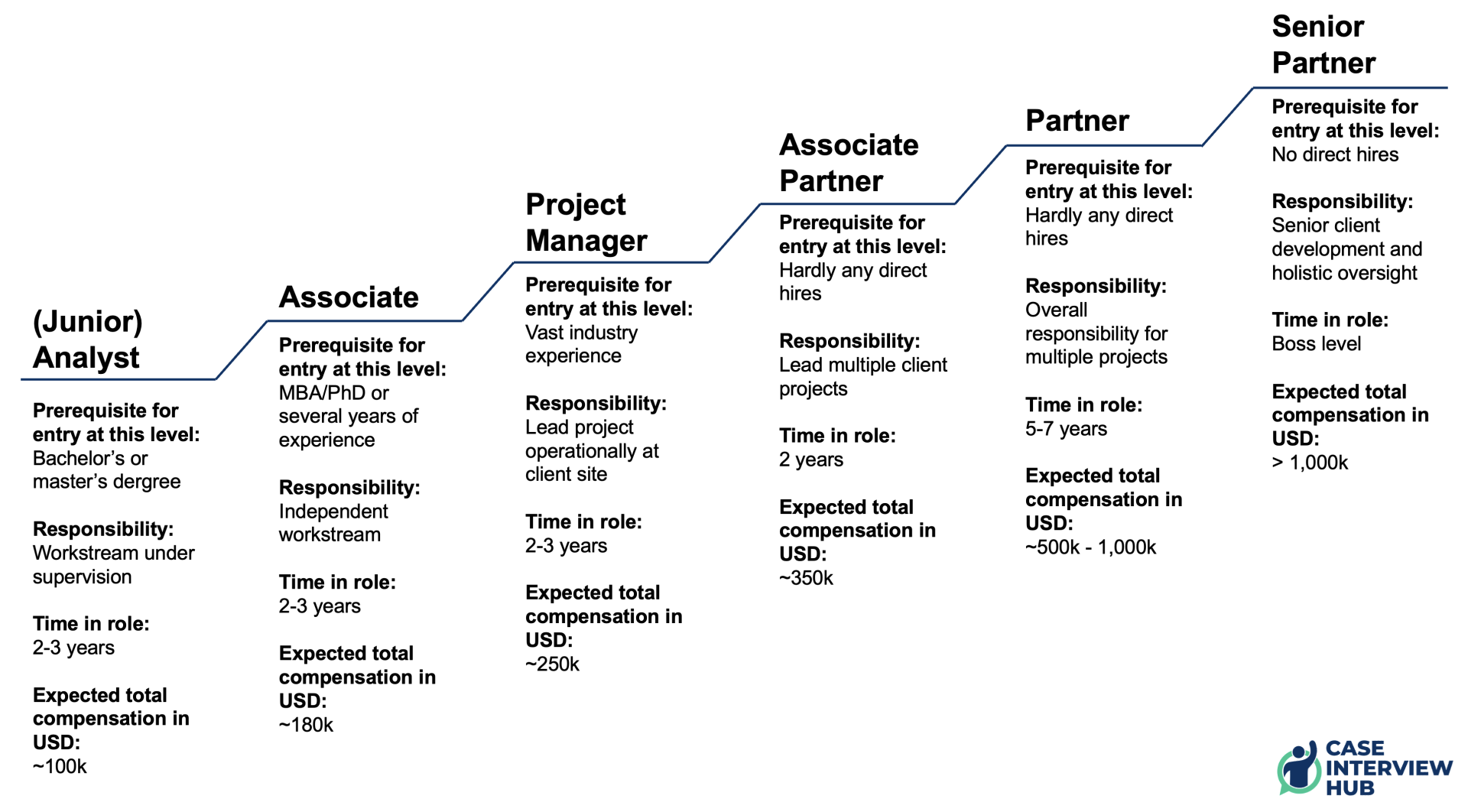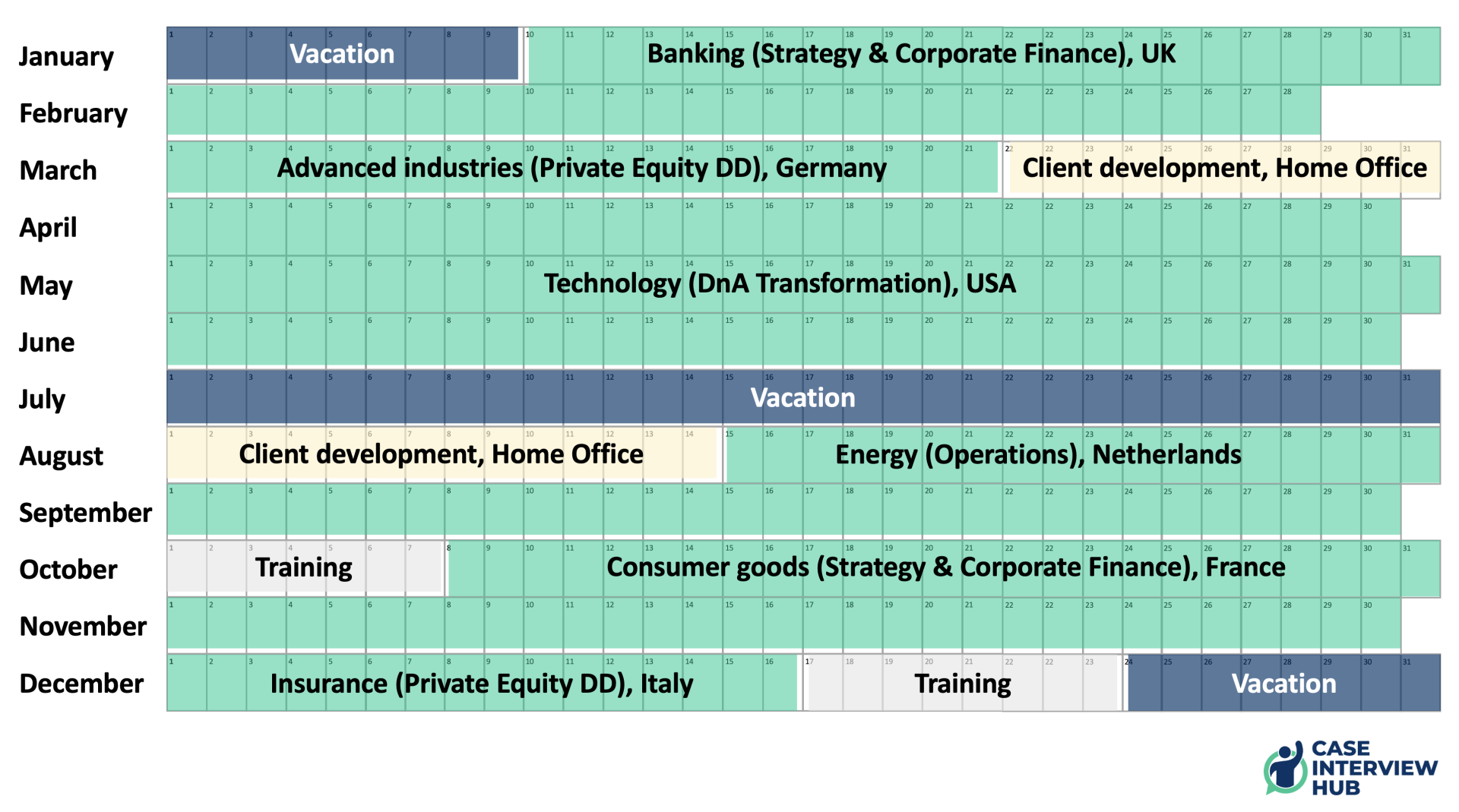Why Consulting:
Reasons to Start your Career in Consulting
Write your awesome label here.
Consulting is one of the most sought-after careers for graduates, and there are many reasons why. From the steep learning curve, the competitive compensation, the inspiring colleagues, all the way to the many exit opportunities — consulting is an attractive career. No matter if you join the MBB firms, the Big 4, or boutique firms.
This action aims at giving you a brief overview about the consulting industry and why it's so popular. If you want to learn more feel free to check out our other resources and blog posts.

High-profile clients
In the early years of a regular corporate career you most likely only get to see one corporation: The one you started with. That's a major difference to consulting. In consulting, you serve the leading companies around the world. You walk in and out of Fortune 500 firms on a daily basis. You are face to face with clients from the start — even as an intern.
It's entirely likely that you'll work with senior executives, even as an analyst in your first year. You have the opportunity to learn from those experienced leaders and observe how they form their opinion to make critical business decisions on a daily business. Moreover, you also get to experience and learn how senior consultants interact with those strong personalities and help them steer their business.
Whenever you hear a big strategic move announced by a large corporation, it's safe to assume that there was a team of consultants at the scene already months before, mapping out the direction together with the C-level management.

Competitive compensation
While the main motivation for people to join consulting is the career boost (i.e., a steep learning curve, a great network, and a fast career progression), we should not forget about the attractive compensation right from the start. Irrespective of your geographic location, if you join a top consulting firm you'll most likely be in the top 10% income bracket in your country, right out of university.
To give some rough guidance, the large firms (the tier 1, or MBB firms) in the US will pay an analyst (fresh bachelor graduate) a total compensation of more than $100,000 per year. After a few years, or if you're hired as an MBA grad, your total compensation will be closer to $200,000 per year already. In other geographies the story is similar. In Germany, an analyst-equivalent (typically with a non-MBA masters degree) makes about €90,000 per year, an MBA or PhD grad will make more than €140,000 per year. Learn more in our blog about the value of an MBB job.
Additionally, these firms generously support you in further education. Those that joined with a bachelors degree, after 2-3 years on the job, typically have the opportunity to do an MBA at a prestigious university or an equivalent degree (for example, in some European countries doing a doctorate is a popular alternative). If your performance is on track, the firms will cover part of the tuition and continue to pay your salary for up to one year. And of course, they'll give you a return offer for a ~50% pay increase.
Moreover, there are many more perks that are beyond what a regular corporate job would offer. From free food at the office canteen to a corporate car, from fitness classes to a great health insurance plan, the firms will provide for their consultants.

Feedback culture and training
Why is feedback so important? Because it's the quintessential way to develop fast and work on the critical skills that make you a successful consultant. An open feedback culture is part of the DNA of the top firms in consulting. As a rookie, you'll get feedback all the time, on everything you do. From how to phrase an e-mail, how you just interacted with the client, all the way to tiny tips like Excel shortcuts. And it never stops. Even partners will get feedback regularly. Not only from other partners and senior partners, but also from their teams – which is critical in the development of their leadership skills.
By receiving feedback on a regular basis you quickly figure out what your strengths and weaknesses are. And the consulting companies offer you plenty of resources (e.g., week long training sessions, online classes, coaching) to further develop your strengths and to work on your weaknesses to become a better consultant overall.
In your early days as a consultant you'll get a lot of training on your hard skills. How to become proficient in Excel and PowerPoint, how to use firm resources, and how to create certain analyses. In your more senior days, you'll get training on how to be the best CEO-whisperer by leading external coaches (e.g., former senior partners, industry executives, or leadership experts).

Fast progression
They say that one year in consulting is like 3 years in a corporate job. This is driven by the intensity of the job, the variety of things you see, the feedback culture, and the world-class training. Within the first year in consulting, you may be on 3 high-profile strategy engagements in 3 different industries in 3 different geographies. Meanwhile, at a corporate job you may be working on the same project for 3 years. In consulting, you are always slightly out of your comfort zone and you can reach the next step on the career ladder every 2 years. For reference, this corresponds to a 50% pay bump each time.
Below is the typical career ladder at MBB firms. Each firm has its own title for the roles, yet their tasks and responsibilities will be very similar. For example, a project manager at McKinsey is called "Engagement Manager" while the same role is called "Project Leader" at BCG. Typically, new hires start at the Analyst or Associate level. External hiring becomes very rare as you move up the ranks. The total salary of MBB firms listed in the chart is just indicative (for the US) and varies heavily across geographies.

The People
In consulting, you're working with some of the brightest minds in the industry which enables you to grow and learn every day. You may be staffed on a project with a physicist from the US, an art historian from Italy, and a former investment banker from Hong Kong – and all of them have extremely impressive vitae. Still, people are down to earth and fun to hang out with. Basically, every goodbye email we read mentions that the toughest aspect of leaving consulting is leaving behind the people. But even when you're out, you're not alone because you're part of a vast network of former colleagues. Even those you haven’t worked with will happily connect with you and help you out. That might sound cheesy, but you are always part of the “family”. And with that, you carry a certain DNA that won't go away if you're moving into a corporate job. Even ten years out of consulting, you're still the “McKinsey guy”.

A fun atmosphere
Even though consultants work very hard and the pressure on projects is high, the atmosphere in the team room is unique. It's not like your typical gray office cubicle, but a dynamic and fun place. Inside jokes lighten up the pressure and discussions with your partners can be fun, intellectual sparring sessions. And once the clients headed home and you're all alone with your team members, there can be a lot of fooling around.
Outside of the team room, your home office will be your refuge (i.e., the local office you are a part of). Most of the time you're not going to be staffed with people from your home office but from all over the world. So your home office is like your safe haven. You mingle with colleagues, chat about projects, have a beer, and join in office activities (sports, parties, you name it).
Events are another part of the lifestyle in consultancies. These could be cooking classes, a wine tastings, or a corporate run for a charitable cause. Aside from smaller events, you'll also be part of sometimes lavish retreats. Depending on your office, you may spend a long weekend sailing at the coast of a Caribbean island, skiing in the Alps, or on a trek in the Arabian desert. These events are all-expenses-paid, sometimes even including spouse and families, and are always thoughtfully planned with a lot of dedication and attention to detail.

The time after consulting
Even while you are in consulting, you'll draw a lot of interest from recruiters and headhunters and even from clients who want to hire you. Once you decide to leave, the firm will also be supportive and help placing you well. There is no grudge when leaving — a high fluctuation is part of the game. Moreover, you could be a potential future client for the firm so there is a mutual interest that you're successful and have good memories about your exit. Even in the startup world you may have an edge. Hiring people, or raising venture capital becomes easier with a great brand name on your CV. An investor can also justify such an investment much more easily. And even if the startup tanks, the investment manager knows it’s hard to fault him for investing in a high-profile team. So, it's pretty obvious that consulting is a great jumping-off point for your career. Who knows — maybe you will be one of the ex-consultants who became Fortune 500 CEOs or found a unicorn start-up. Or you just win a Grammy, like John Legend (former BCG Associate).

Up or out is out
If you heard about consulting, you've probably heard about "up or out". It means that you're expected to perform and to reach the next career step, or hierarchical level, within a certain time period. If you don’t make it, you're fired. This obviously sounds terrifying to a lot of people and is a huge turn-off. However, it doesn't actually work like that. It’s not like everything seems fine and then, one day, you get a bad performance review and are asked to pack your things. Rather, if your performance is bad, you will notice it yourself. And if you're fresh on the job, you'll realize that within a few months. It's just not a job for everyone, and that's perfectly fine. So it's typically no surprise, but rather a mutual decision that this isn't the ideal fit. Those that leave at this point, often go on to have great careers, but not in consulting. And having a 6 month stint at McKinsey on your resume is not a failure, it's already a big win.
For those that stay on the consulting path, yes, people are promoted regularly and quickly - and there are time windows within which a promotion is expected. But the firms are very supportive of their employees, and give guidance, tailored advice, and training so that this is possible. Also, there is quite some variance and flexibility in your career progression, and even more so the longer you stay with a firm. For example, McKinsey introduced the “Pace” program, so that project managers can remain in their role for longer, before being expected to handle multiple projects at once (which is what the next level — a junior partner — would be doing). The great thing is, you're not fighting with anyone for a promotion. The large firms will promote on merit, and not on open positions.

A year in consulting
Hardly any other job will allow you to have such a variety of experiences within just a one year time period. As a junior in the top firms, you'll be staffed on one project exclusively, so no juggling of multiple projects. At the same time, you're not yet as specialized, meaning you have the chance to see many different things. The projects are typically between 1 and 6 months long, with most of them being somewhere between 2-3 months. At smaller firms and those that are more focused on implementation, projects tend to be longer and there may be overlap between projects (i.e., two projects at the same time).
At an MBB firm, you may start the year with a 10-week strategy project for a telecom provider. After a week of training, which allows you to decompress and connect with colleagues, you could move on to a due diligence. Within 4 weeks you'll help a private equity fund understand a certain company and a particular market niche. After that, you may be the consulting firm's internal expert for pet food or lawn mowers. Next, you may move on to a 4 months operations project at an oil refinery. You walk around in steel-toed shoes on the factory floor and help understand and optimize processes. Afterwards, you take time off for 6 weeks to fulfill your dream of hiking through New Zealand. Following some more training, you finish the year with a digitization project at a healthcare provider. Within 2 months you figure out which improvement measures deliver the highest impact and how you can launch the first pilot initiatives.
Below is the second-year experience of one of your team members at an MBB firm (pre-Covid). As you can see, the colleague aimed at exploring as many industries and regions as possible, without a particular specialization (which is perfectly fine in the first two years). The goal was to gain a wide variety of experiences. Between projects, she spent time either on client development until a project came along that fit her needs, or on internal trainings. In that one year, she probably gained more lasting professional experiences than many people in a corporate job 5 years. Kudos to her!


